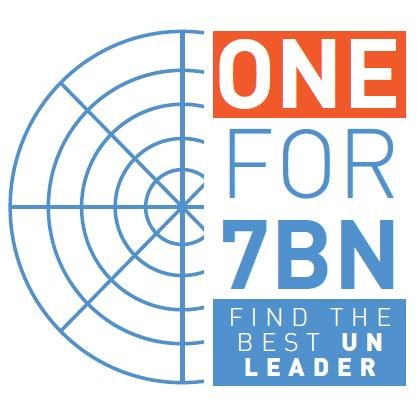1 for 7 Billion Campaign
Visit 1for7billion.org to learn more about the campaign or take action now.
The Issue
The Secretary-General is traditionally chosen in secret, by just five countries that hold permanent seats on the Security Council, in an opaque and outdated process for the rest of the UN’s membership to rubberstamp. An open and inclusive selection process, with genuine involvement by all UN Member States, will increase the chances appointing the Secretary-General the world needs and could give future Secretaries-General a stronger mandate. That in turn would boost their ability to mobilise support for the UN and drive forward its agenda. A better process would also help to revitalise the UN, enhance its effectiveness and credibility, and reaffirm its global authority and popular appeal.
Although agreement has recently been reached to improve the selection process, many reforms are yet to be implemented and the process continues to suffer from the following:
Control by the most powerful countries
Candidates for Secretary-General are nominated by governments, after which the Security Council agrees on one final nominee – usually the result of secret bargaining among the five permanent members of the Council, subject to their individual vetoes. The General Assembly routinely confirms the final nominee by a majority vote. Thus, the permanent five members can choose candidates that suit their short-term interests.
Absence of basic recruitment standards
The current process falls short of the UN’s own principles, basic recruitment standards and current practice at other international organisations.
• There is no job description or comprehensive selection criteria
• There is no timetable and no public scrutiny of candidates
• The Security Council's "shortlist" contains just one name
• Backroom deals can get you elected
• No woman has ever held the post
No transparency, no accountability
There is no systematic and transparent reporting during the process. Candidates can be put forward at the last minute, leaving no time for scrutiny. There is little opportunity for meaningful involvement by the wider UN membership, other than the moment when the final decision is taken on the single candidate put forward, let alone opportunities for engagement by civil society or the general public.
Open to 'horse trading'
The permanent members of the Security Council - and other powerful states - have been known to seek promises from candidates on other senior UN appointments in exchange for support and candidates have been known to make such promises.
Ten Proposed Reforms
The 1 for 7 Billion campaign is a growing coalition of NGOs and individuals from across the world calling for an open, fair and inclusive process to select the best possible candidate for Secretary-General of the UN. To this end, the following ten reforms are proposed.
- The position and qualifications should be advertised in all countries, with a call for nominations by Member States, parliaments and civil society organisations, and include a closing date for nominations.
- A formal list of selection criteria should be published by the UN; these criteria should stress that the best person should be chosen irrespective of his or her country of origin.
- A clear timetable for the selection process should be made public by the President of the General Assembly and President of the Security Council, no later than the start of the GA’s 70th session.
- A list of all the official candidates and their CVs should be published by the President of the GA at the end of the nomination phase and by the Security Council President when considering its list of preferred candidates.
- The President of the General Assembly and the President of the Security Council will be jointly responsible for regularly updating the UN membership and general public on the selection process once the full list of candidates has been announced.
- Each candidate should release a manifesto, which should include their policy priorities and a commitment to selecting senior UN officials on the basis of merit, irrespective of their country of origin.
- Once the names of all candidates have been announced, the General Assembly should organise a series of open sessions that will enable member states as well as the public and media to scrutinise candidates and their manifestos.
- The GA should insist that candidates do not make promises to individual countries on senior appointments, and member states should undertake not to seek such promises.
- The Security Council should be encouraged to present two or more candidates for the General Assembly to appoint as Secretary-General.
- The term of the Secretary-General should be limited to a single, non-renewable period of seven years.
1 for 7 Billion Campaign Materials
Policy Platform
English | Arabic | Chinese | French | Russian | Spanish | German
Principles and recommendations - a commentary
Chart comparing different UN appointment processes
Chart comparing country positions on the proposal for the Secretary-General to serve a single term
Appointment of the Secretary-General for a longer single term
1 for 7 Billion Letters
Letter to General Assembly Ad Hoc Working Group (March 2018)
Letter to Secretary-General advocating fair, open, inclusive senior appointments (February 2018)
Letter to General Assembly Ad Hoc Working Group (February 2018)
Letter to General Assembly Ad Hoc Working Group (March 2017)
Letter to P5 members on veto transparency (October 2016)
Letter to UNSC permanent members on UNSG selection process (October 2016)
Letter to candidates asking them to commit to serving a single term
Letter to Foreign Ministers (February 2015)
Open NGO letter to world leaders (November 2014)
Click here for related documents.

